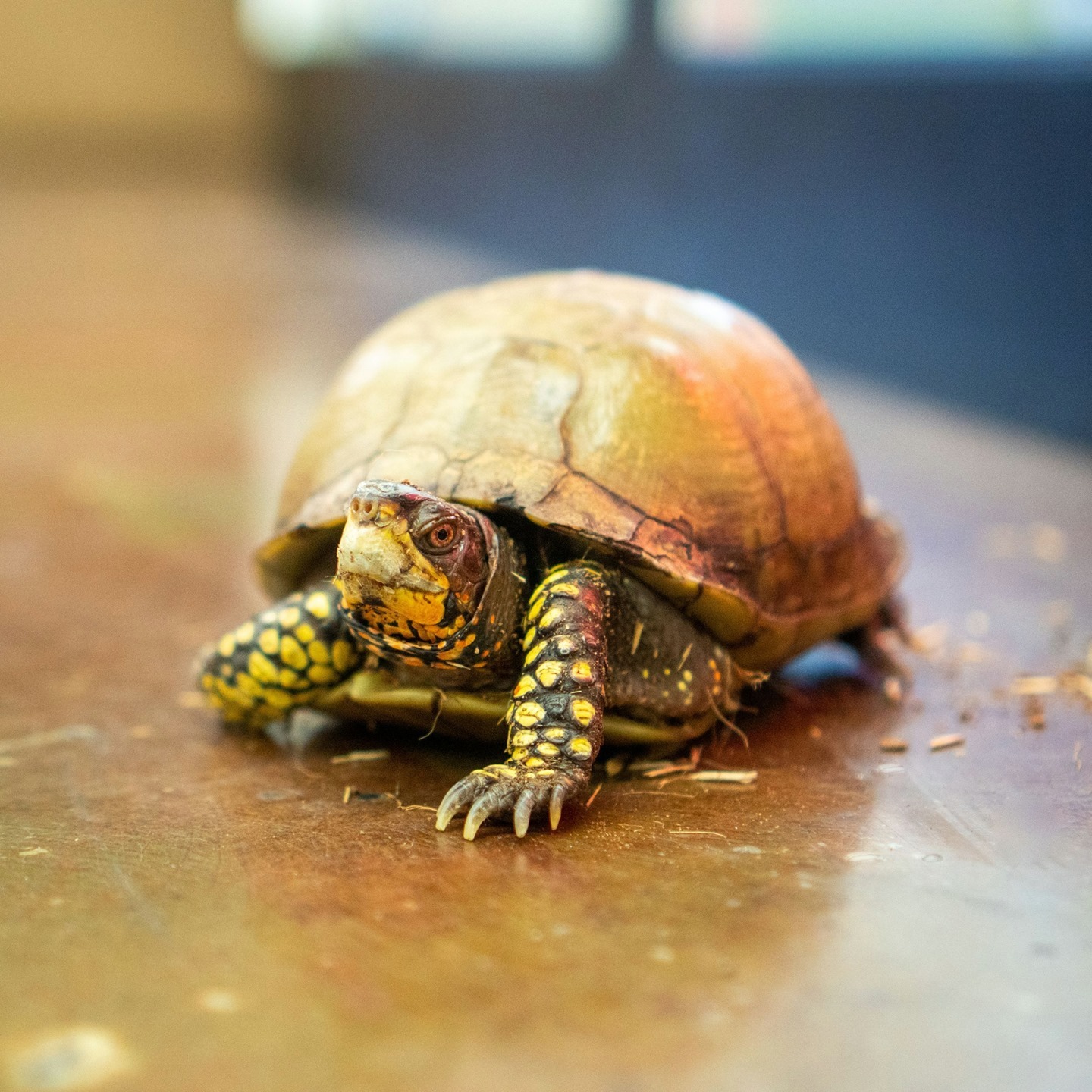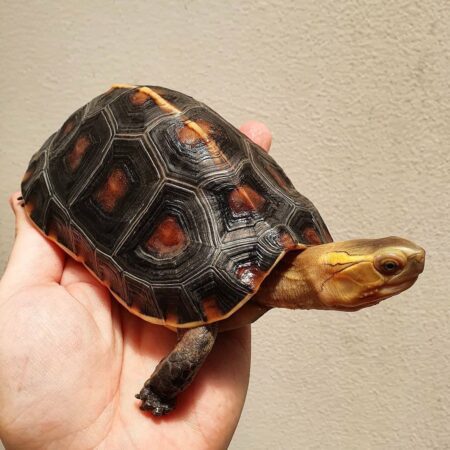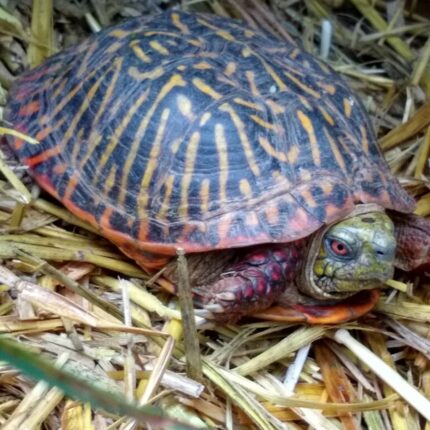3 Toed Box Turtle is named for the three toes on its hind feet; the other box turtles have four. These handsome, classic-looking turtles are native to the United States and are among the most popular pets for turtle enthusiasts. However, three-toed box turtles (and box turtles in general) aren’t especially well-suited to be pets for new turtle owners or in homes with very young children. These animals don’t like to be handled and can suffer stress-related health problems if they are picked up. They actually require a significant amount of care compared to other species of turtles and prefer consistency in their environments; even just a ride to the veterinarian can prove stressful for a box turtle. This is why these turtles should only be taken on by the advanced turtle keeper.
Three-toed box turtles have a high, domed carapace (dorsal shell) that is usually olive-brown with some yellow markings. On the plastron (ventral or chest shell) there may be dark blotches. The skin is brown with some yellow spots, and the males may have red markings on their heads with occasional red, orange, and black on the neck and forelegs.
Three-Toed Box Turtle Behavior and Temperament
Three-toed box turtles can live in a wide variety of habitats, from woodlands to meadows, but they are usually found near a water source. They often venture into shallow waters, perhaps more so than the other box turtles.
In the wild, three-toed box turtles have been observed migrating with the seasons, since they prefer humid environments. Like their cousins, three-toed box turtles hibernate in cold weather; in warmer climates, they stay active.
It is not unusual for three-toed box turtles to wade into shallow water to drink and have a soak, more so than most North American terrestrial turtles. They also seek out water and soak for long stretches if they feel safe doing so. Three-toed box turtles are more likely to spend extended time in the water than other box turtles. If their environment becomes too dry, three-toed box turtles in the wild may burrow into leaves or other ground covers to better retain moisture.
Housing the Three-Toed Box Turtle
If the climate is agreeable they do much better outside. Build your outdoor enclosures on well-draining soil with non-toxic, rot-resistant walls at least 20 inches tall; the wall barrier should also extend down, at least 10 inches underground to prevent your turtles from digging an escape. The minimum size is four feet wide and four feet long but doubling the length to eight feet is preferred.
This species needs room to roam and dig. While it is possible to keep hatchlings and juveniles in a large indoor terrarium (aquariums are too small), adults need a much bigger space. Each turtle in your terrarium needs at least three square feet of floor space for every eight inches of shell length. Juveniles need an area that is at least two square feet in dimension.
Both indoors and outdoors, they should have easy access to available hiding spots and loose-leaf litter in which to burrow. Provide a large shallow pan of clean water at all times, but make sure they can easily get in and out of the water without tipping over into water and potentially drowning.
Males often have red or orange markings on the head and sometimes the neck and forelegs. They also have longer, thicker tails than the females. In addition, the plastron is slightly concave in males and flatter in females. Males have red irises, and typically, the claws on the hind feet are shorter and more curved than those on the females
Heat
When they are kept indoors in a terrarium, maintain the daytime temperature gradient from about 75 F on the cold side to a basking spot with temperatures of 85 to 88 F. The nighttime temperature of any part of the enclosure should not drop below 70 F. Use a ceramic heater as a heat source.
If your turtle is kept in an outdoor pen, make sure there are both sunny and shady areas available, including underneath hideouts. Each turtle should be able to move from cooler to warmer areas as it chooses.
Light
These turtles need exposure to ultraviolet light to produce vitamin D3 so they can properly absorb calcium from their diet. Include a UVB-emitting reptile light. Without it, your turtle will become lethargic, lack an appetite, and can even develop metabolic bone disease (MBD) causing faulty growth and development.
Humidity
Box turtles are much less likely to develop any kind of infection when kept in a humid environment. Regularly mist their pen or run a sprinkler for added moisture, as even in captivity, three-toed box turtles prefer a bit more humidity than others.
Adding a weak heater above the water bowl will also cause some evaporation for higher humidity. Make sure to always place heaters safely away from your turtle as they do get hot enough to cause burns. Add a hygrometer to the enclosure to ensure that the humidity stays at around 70 to 80 percent.
Substrate
3 Toed Box Turtle need a moist (but not wet) ground layer, or substrate. Coconut husk fiber (bed-a-beast, eco earth, forest bed, etc.) is an ideal, natural material that retains moisture. Bark chips and clean sand can be mixed in. Other good materials include cypress mulch, peat moss, or topsoil mixed with sand. Apply a minimum depth of three inches to allow for digging
Avoid using Perlite, Vermiculite, and Styrofoam as these cause gut impaction problems when ingested either on purpose or accidentally. Coarse gravel, silica, calcium sand, cat litter, and walnut shells are all associated with causing small scrape lesions on the turtle’s exterior that often lead to chronic infection. Also, newspapers with ink, rodent pellet bedding, aspen shaving, pine bark, and cedar are all common pet substrates that are moderately toxic and can cause respiratory problems or even death in reptiles.
If your living space is very dry and maintaining humidity is a challenge, there is a workaround that works beautifully to maintain constant uniform hydration to the habitat via evaporation. In a waterproof enclosure, first lay down a layer of pea-gravel (medium-sized is best). In one easy-access corner, build up the gravel an extra inch high to act as a downspout or water delivery channel. Then add clean (non-chlorinated) water up to only half the depth of the average gravel depth. Use your chosen substrate material as the top layer. You will have to replenish the evaporated water regularly by adding to the gravel access corner.
Food and Water
While hatchlings are juveniles are more carnivorous in order to grow, the adult three-toed box turtles are omnivores. Approximately half of their diet should be made up of vegetables, fruit, and hay/grasses; the remainder is made up of low-fat protein sources. Whole live foods are ideal (earthworms, slugs, snails, mealworms, crickets, grasshoppers, small fish, etc) but cooked lean meats and low-fat, high-quality dog food can be added as a supplement.
In order to prevent captive, non-foraging turtles from becoming obese, the amount to feed should be whatever they will eat in under 10 minutes. If using this schedule, feed your turtle no more than three days per week. If feeding juveniles, feed them only every other day. Only give what they will eat in under 10 minutes; feed in the morning or afternoon, matching the times when your turtle is typically most active.
Common Health and Behavior Problems
Respiratory infections are common in these turtles. The signs of a respiratory infection include open-mouthed breathing, wheezing, nasal discharge, and drooling. These can be caused by bacteria, viruses, or fungi, but certain conditions make it more likely that an infection will take hold in your turtle: some combination of a deficiency in vitamin A, enclosure air that is too cold or too dry, and malnutrition.
Vitamin A deficiency is usually the result of a nutrient-poor diet. Although they will eat any leafy greens, some varieties (like iceberg lettuce) just don’t have enough of the nutritional value that turtles need.
Shell rot is the result of either a bacterial or fungal infection. This condition is serious and painful for the turtle and, like other common ailments, should be treated by a veterinarian who specializes in reptiles. Shell rot sometimes appears following an injury to the turtle’s shell.
Choosing Your Three-toed Box Turtle
Box turtle populations are declining around the world; many U.S. states protect box turtle populations and have laws against collecting box turtles from the wild. Unfortunately, thousands of box turtles are still collected annually to supply the demands of the pet trade. Most of these turtles (which live for decades in the wild) will die within 12 months of capture as all wild-caught specimens do not adjust well to captivity and tend to die from stress.
It is best to get a 3 Toed Box Turtle that has been bred in captivity from a reputable breeder, as most will not sell a turtle that has health issues. Any bumps or redness on the shell, mucus in the nasal area or mouth, or cloudy eyes may indicate a turtle with health problems
We have some fantastic captive bred super colorful 3 toed box turtles for sale. The 3 toed Box turtle for sale is one of the most popular box turtles for sale online in the United States and is also known for being one of the more colorful species of box turtle for sale in the world. Average size is 5.5″.













Reviews
There are no reviews yet.